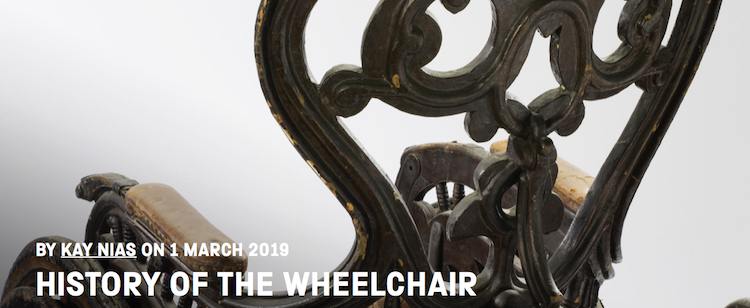I had the great pleasure of spending an hour in conversation with Dr Kay Nias this morning.
Kay is a Medicine Galleries Research Fellow at the Science Museum specializing in the history of physiotherapy, and has recently posted a beautifully illustrated and written piece on the history of the wheelchair on the UK’s Science Museum website.
Kay’s work centres on interrogating the extensive archive of physiotherapy objects, texts, and ephemera held by the Science Museum, and during the year she is exploring the different ways physiotherapy has been thought and practiced over its history.
Kay’s doctoral thesis, Negotiating Intimacies: Gender, Rehabilitation and the Professionalisation of Massage in Britain, c.1880-1920 will hopefully be available soon (it’s currently embargoed), but here is the abstract to give you a taste of some of the work she has done to date:
Massage was professionalised in Britain in 1895 by the Society of Trained Masseuses (STM), a small group of nurses and midwives mainly concerned with giving general massage to neurasthenic women. By the end of the First World War the massage profession had been transformed – a key participant in the rehabilitation of the nation’s wounded soldiers; publically, medically and politically acclaimed; and a specialism fully embryonic of physiotherapy. This thesis examines the professionalisation of massage from c.1880-1920. It argues that in order to fully understand the development of the profession in this period we have to move away from institutional teleologies, linear narratives of ‘medical control’ and embrace the myriad of socio-cultural, economic, political and professional forces driving and shaping this process. To explore these wider forces this thesis looks beyond internal institutional dynamics and examines a number of locations where massage was practised. Beginning with an examination of how massage was translated from a traditionally lay-treatment into the language of medical orthodoxy, this thesis considers its adoption into British medicine, its development as a practice and a profession, and its entry into the First World War. Fiercely contested both medically and ethically throughout the period, the practice of massage offers a new lens through which to examine the complex socio-cultural and professional negotiations shaping the course of professionalisation. This thesis argues that debates about massage, gender and intimacy were intricately woven into the formulation of professional boundaries, conditioning the relationship between patient and masseuse as well as the masseuse and medical practitioner. Focus on practice also yields insights into broader socio-economic and political concerns about disability, productivity and military efficiency. It situates the evolution of massage, practically and professionally, as part of the wider development of rehabilitation within society and medicine during this period. By contextualising the early professionalisation of massage in this way, this thesis offers new perspectives on the complex interplay between the development of physiotherapy, society and medicine.
Kay is also coordinating a symosium at the Science Museum in London on 23rd May 2019 titled Mechanical Medicine: Exploring the History of Healing by Exercise, Manipulation and Massage which we highlighted here earlier.

